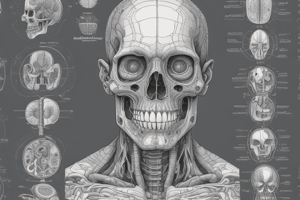Podcast
Questions and Answers
Which organ system is responsible for defending against infectious diseases and providing fluid homeostasis?
Which organ system is responsible for defending against infectious diseases and providing fluid homeostasis?
- Cardiovascular system
- Lymphatic and immune systems (correct)
- Reproductive system
- Integumentary system
Which organ system is primarily involved in excreting metabolic wastes and providing pH and fluid homeostasis?
Which organ system is primarily involved in excreting metabolic wastes and providing pH and fluid homeostasis?
- Urinary system (correct)
- Respiratory system
- Endocrine system
- Digestive system
Which organ is part of the integumentary system?
Which organ is part of the integumentary system?
- Liver
- Lungs
- Skin (correct)
- Pancreas
Which body cavity becomes the thoracic, abdominal, and pelvic cavities in later development?
Which body cavity becomes the thoracic, abdominal, and pelvic cavities in later development?
Which organ system is responsible for producing hormones and regulating metabolism and stress responses?
Which organ system is responsible for producing hormones and regulating metabolism and stress responses?
Which organ system provides support and protection, assists in movement, and stores minerals?
Which organ system provides support and protection, assists in movement, and stores minerals?
Which organ is part of the cardiovascular system?
Which organ is part of the cardiovascular system?
Which organ system is responsible for ingesting, digesting, and processing food, as well as absorbing nutrients and eliminating waste?
Which organ system is responsible for ingesting, digesting, and processing food, as well as absorbing nutrients and eliminating waste?
Which organ system assists in exchanging gases at both lungs and tissues as well as in pH homeostasis?
Which organ system assists in exchanging gases at both lungs and tissues as well as in pH homeostasis?
Which organ is related to the nervous system?
Which organ is related to the nervous system?
Which body cavity is called coelom in early development?
Which body cavity is called coelom in early development?
Which organ is NOT part of the endocrine system?
Which organ is NOT part of the endocrine system?
Which cavity contains the rectum, urinary bladder, and internal reproductive organs?
Which cavity contains the rectum, urinary bladder, and internal reproductive organs?
What is the specific name for the serous membrane that covers the heart?
What is the specific name for the serous membrane that covers the heart?
Which type of body membrane secretes synovial fluid into the joint cavity?
Which type of body membrane secretes synovial fluid into the joint cavity?
Which part of the dorsal cavity contains the brain?
Which part of the dorsal cavity contains the brain?
What is composed of an epithelium overlying a loose fibrous connective tissue layer and secretes mucus to protect the body from invasion?
What is composed of an epithelium overlying a loose fibrous connective tissue layer and secretes mucus to protect the body from invasion?
In which type of membrane does inflammation lead to thicker synovial membranes, restricting movement in freely movable joints?
In which type of membrane does inflammation lead to thicker synovial membranes, restricting movement in freely movable joints?
Which cavity separates from the abdominal cavity by a horizontal muscle called the diaphragm?
Which cavity separates from the abdominal cavity by a horizontal muscle called the diaphragm?
Study Notes
- Organ systems are groups of organs that perform similar functions in the body.
- Organs can be found in specific body cavities or throughout the body.
- Membranes line the cavities and internal spaces of organs and tubes, and are of four types: mucous, serous, synovial, and meninges.
- The human body is divided into two main cavities: the ventral (thoracic, abdominal, pelvic) and dorsal (cranial, vertebral) cavities.
- Organs include the skin (integumentary system), heart and blood vessels (cardiovascular system), lymphatic vessels, lymph nodes, spleen (lymphatic and immune system), oral cavity, esophagus, stomach, small intestine, large intestine, salivary glands, liver, gallbladder, pancreas (digestive system), lungs (respiratory system), kidneys and urinary bladder (urinary system), testes, penis, ovaries, uterus, vagina (reproductive system), bones (skeletal system), brain and spinal cord (nervous system), and endocrine glands (endocrine system).
- Mucous membranes line the tubes of the digestive, respiratory, urinary, and reproductive systems, and secrete mucus that protects the body from invasion by bacteria and viruses.
- Serous membranes line the closed cavities of the body and secrete a watery fluid that keeps the membranes lubricated, supporting the organs and compartmentalizing the large thoracic and abdominal cavities.
- Synovial membranes line the cavities of freely movable joints and secrete synovial fluid into the joint cavity, lubricating the ends of the bones.
- The meninges are membranes within the dorsal cavity that protect the brain and spinal cord.
- The body contains various organ systems that perform specific functions, such as the digestive, respiratory, cardiovascular, lymphatic and immune, urinary, reproductive, skeletal, nervous, and endocrine systems.
- Organs are grouped according to their functions and are found in specific body cavities or throughout the body.
- Membranes line the cavities and internal spaces of organs and tubes, and are of four types: mucous, serous, synovial, and meninges.
- The human body is divided into two main cavities: the ventral (thoracic, abdominal, pelvic) and dorsal (cranial, vertebral) cavities, and contains various organs including the heart, lungs, stomach, liver, kidneys, and brain.
- Mucous membranes secrete mucus that protects the body from bacteria and viruses, while serous membranes secrete fluids that lubricate the organs and support them.
- Synovial membranes secrete synovial fluid that lubricates joints, and the meninges are protective membranes surrounding the brain and spinal cord.
- Organs perform specific functions within their respective organ systems, and are supported and protected by the body's cavities and membranes.
Studying That Suits You
Use AI to generate personalized quizzes and flashcards to suit your learning preferences.
Related Documents
Description
By Ahmed Safaa Telegram channel : https://t.me/mcqb2




